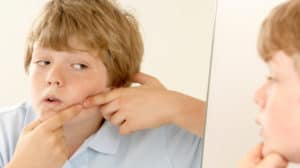The causes and contributors to eating disorders are many and complex. Although the following influences do not constitute a comprehensive list of contributing factors, they are often present in eating disorders.
Disclaimer for Eating Disorders Article
Content Caution: This article offers a candid look at eating disorders. Some aspects of the discussion may prove difficult for sensitive readers.
Influences
We live in a culture that is driven by the pursuit of perfection. Unrealistic expectations for our physical appearance are common for many. Conversely, satisfaction with one’s body seems rare for the vast majority of Americans (witness the growth of the diet and fitness industry in the last 10 years).
Society is obsessed with dieting and places great importance on thinness and physical perfection.
We are bombarded with messages, visual and otherwise, that illustrate beauty in a picture of thinness that few can attain. Airbrushing and computer-enhancement are often used by the media to create this false picture of perfection. Body doubles are used in movies to promote the illusion of physical flawlessness. Many models seen in advertising are 13 to 16 years old, offering a representation of beauty unattainable for most. Sadly, individuals who do not feel affirmed and valued because of impaired identities and deficits in their sense of self may swallow these lies, feeling that the only way to be accepted by others is to be “perfect.”
Eating disorders are often the result of entwining of societal pressures and the individual’s psychological makeup. Unable to feel valued and wanting to attain acceptance through thinness and perfection, the basic human activity of eating becomes fertile soil for the onset and progression of an eating disorder.
Family Influences
Family relationships are complex and central to the development of a child’s sense of self. Often these family relationships are replicated with others. One patient in treatment for her bulimia writes:
“My parents were healthcare professionals who gave us a great home, love and many advantages growing up, but there were unspoken high expectations. My brother, sister and I were high achieving, straight-A students. We were the “perfect” family outwardly, but my spirit was wounded when I did not receive the time and attention I needed from my well-intentioned father. Unknowingly, I was developing a strong hunger for male attention that would later cause me grief. In high school I excelled in sports, and that became the key to my individuality and identity, creating a limelight that did not include my siblings.”
Writing later of her experiences in treatment, she continues:
“I was in treatment long enough to begin to recreate my family dynamics with staff and peers —a very important piece of my treatment experience. As I began to experience events that previously triggered my eating disorder behaviors, I was unable to run to my bulimia or other unhealthy coping mechanisms. Inner growth began as I endured the emotions‚ and hurt and began to problem-solve. Success at problem solving led to contentment and victory over the urge to practice my eating disorder behaviors. That feeling of contentment gave me courage to carry out the new coping skills I was learning.”
The Facts of Eating Disorders
Buck Runyan, MS, CPC, program director at Remuda Programs’ Adolescent Facility writes:
“There is a common emotional characteristic which girls who develop eating disorders share. They tend to be hypersensitive. They are easily affected by the emotional content in the home. When the home has tension, pain, anger, sorrow, guilt or shame, regardless of their origin, girls with eating disorders tend to personalize them. These feelings are then avoided or denied. Most physically store their feelings in a combination of two places, the stomach and head. They may perceive their stomach to be sensitive, queasy, big or full. She may not have ingested physical nutrients to cause these perceptions; for it may be that she has literally swallowed her emotions. When the stomach is “full” of emotions, it is extremely difficult to add real food to such a small organ. It is not unusual for these girls to be academically talented. They may direct their mental capacities toward controlling the basics of their existence including what goes into their bodies. They may have been called unceasingly stubborn or exceptionally gifted; yet what remains is the fact that this ability for self-discipline can be the steel girder holding the eating disorder in place.”
All families have their areas of dysfunction. Some families experience obvious relational problems, while others have what appear to be minimal difficulties. But even in highly dysfunctional families, not all children will develop eating disorders. The question then becomes: What gives one family member the strength to overcome their family’s shortcomings while another family member is damaged so severely by the same set of circumstances? The answer may be found in the Bible, which tells us of our God-given uniqueness (Psalm 139:14).
In the eating disorder recovery process, the family system needs to work together with the individual suffering from the disorder. As each family member takes responsibility for his or her part of the process, healing begins.
Past Events
At the core of an eating disorder is often a specific, traumatic incident, or a set of circumstances or perceptions, that have wounded the person in such a way as to lead to an expression of that pain through the symptoms of an eating disorder. These experiences or perceptions may involve abandonment, rejection or neglect. Additionally, physical, emotional, or sexual abuse often lies at the heart of the shame that traps eating disordered individuals in their pain. The emotional difficulties of eating disordered individuals revolve around control, mistrust, shame, guilt, dysfunctional family and interpersonal relationships, frozen emotions and perfectionism.
From these problems, defense mechanisms and other coping skills develop, allowing the person to survive the painful event. This creates a “scab” over the wound, but does not allow true healing. As the wound festers with the passing of time, the victim’s sense of self becomes more and more disrupted.
In many cases, there are links between the family’s medical and psychological history and the individual’s eating disorder. It is common to discover that the family background contains various psychological illnesses (such as depression, severe anxiety or personality disorders), various addictions (such as alcohol or drugs), relational, sexual and/or eating disorders and various physical ailments. Research has not yet determined whether the causal factors are psychological or biological. It appears to be closely intertwined and therefore must be treated in unison for the best results.
Final Thoughts on Eating Disorders
Eating disorders are defense mechanisms that “protect” individuals from the pain and woundedness of their life experiences. Breaking through this cycle of faulty thinking requires the help of a trained mental health professional.




















